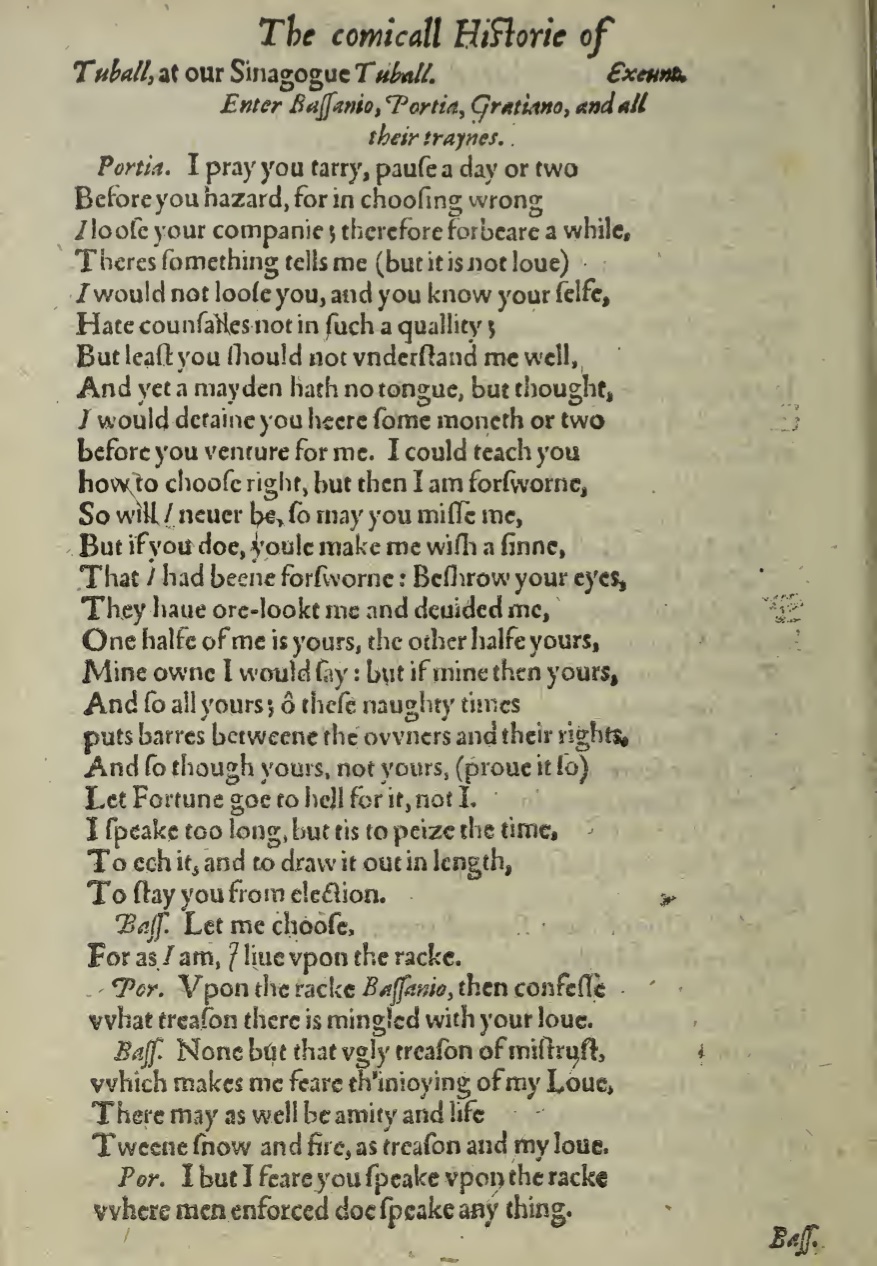Editorial note
The following passage from The Merchant of Venice depicts Portia and Bassiano conversing at the beginning of Act III, right before Bassiano chooses the correct casket to win Portia's hand in marriage. Portia cautions Bassiano over making a rash decision because she likes him and doesn’t want him to leave if he chooses wrong, and Bassiano assures her that he's making a correct, and quick, decision because he cannot bear to live without her.
The passage, as it is written in the First Quarto, contains several word and spelling choices that make the section hard to decipher for the modern reader. The translation on the right aims to simplify the reading for the modern audience, while still maintaining a relationship with the original words Shakespeare wrote.
Words and phrases that are not common for the modern reader have been selected and typed in pink, and in parentheses, synonyms have been added to aid comprehension. In the definition section, you will find definitions of the original phrases and words as they are found in the First Quarto. Additionally, words that have been typed in green are words that were spelled differently from what a modern-day reader would be used to, such as using a ‘u’ as a ‘v.’
Shakespeare's word choices are important to a reader's understanding of the text and by leaving them in the language is preserved as he intended. On the other hand, the English language has changed since the late 16th century and modern readers and audiences can struggle to completely understand the meaning of some lines without some guidance. By placing synonyms next to the original words readers may have an easier time comprehending some of the 16th-century words, and the addition of the definitions helps further clarify the word's meanings. Changes made in word spelling serve a similar purpose, spelling words more modernly aids the readers comprhension.
The comical History of
Tuball, at our Synagogue Tuball.
Enter Bassanio, Portia, Gratiano, and all
their traynes.
Portia. I pray you tarry (have patience/wait), pause a day or two
Before you hazard (take the risk), for in choosing wrong
I lose your company; therefore forbeare (wait, think about it) a while,
There’s something tells me (but it is not love)
I would not lose you, and you know your self,
Hate counsailes not (does not make me feel) in such a quality (this way);
But least you should not understand me well,
And yet a maiden hath no tongue, but thought,
I would detain you here some month or two
before you venture for me. I could teach you
how to choose right, but then I am forsworne (broken my oath),
So will I never be, so may you miss me,
But if you do, you’ll make me wish a sinne (wish I had sinned),
That I had been forsworne: Beshrow (I curse) your eyes,
They have ore-lookt me (looked upon me) and divided me,
One half of me is yours, the other half yours,
Mine own I would say: but if mine then yours,
And so all yours; ô these naughty times
puts barres between the owners and their rights,
And so though yours, not yours, (prove it so).
Let Fortune go to hell for it, not I.
I speak too long, but tis to peize (waste) the time,
To ech (stretch) it, and to draw it out in length,
To stay you from election.
Bass. Let me choose,
For as I am, I live vpon the racke (being tortured).
Por. Vpon the racke (being tortured) Bassanio, then confess
what treason there is mingled with your love.
Bass. None but that ugly treason of mistrust,
which makes me fear th'inioying (the enjoyment) of my Love,
There may as well be amity (friendship) and life
Tweene snow and fire, as treason and my love.
Por. I but I fear you speak vpon the racke (while being tortured)
where men enforced do speak anything.
Definitions (words in pink)
Tarry: stay longer than intended; delay leaving a place
Hazard: to take a risk with the chance of losing something, to take a risk to try to gain something
Forbeare: to bear with, have patience
Counsailes: (counsels) to offer advice, advice someone
Foresworne: someone who has abandoned or gone back on an oath in a way that is irrevocable
Beshrow: (beshrew) to curse, or wish ill on someone
Peize: to weigh, of gravity, has importance, is heavy
Ech: (eke) to increase, add, to lengthen.
Amity: friendship, friendliness, cordiality; friendly relations, esp. of a public character.
Notes (words in green)
The words written in green are words that where spelled differently in the First Quarto, and then changed to make reading easier on our version. Changes include;
- v's used as u's where changed to u's, such as "vpon" -> "upon"
- the long s's where replaced with a short s, such as "ſnow" -> "fire"
- extra e's at the end of a word, or in a word were removed, such as "halfe" -> "half", or "moneth" -> "month"
- spaces between common compound words where removed, such as "any thing" -> "anything"
Image credit: Rare Books & Manuscripts Department, Boston Public Library, copy G.176.16. The most excellent historie of the merchant of Venice. First Quarto. London: 1600.
Citing this page: Shakespeare, William. The Merchant of Venice, E3v. London: 1600. Cacodemon Digital Shakespeare. Edited by Ella Bramwell & Arina Zvereva. Source edition: Rare Books & Manuscripts Department, Boston Public Library (copy G.176.16). http://cacodemonshakespeare.com/comedies/merchant/e3v.
